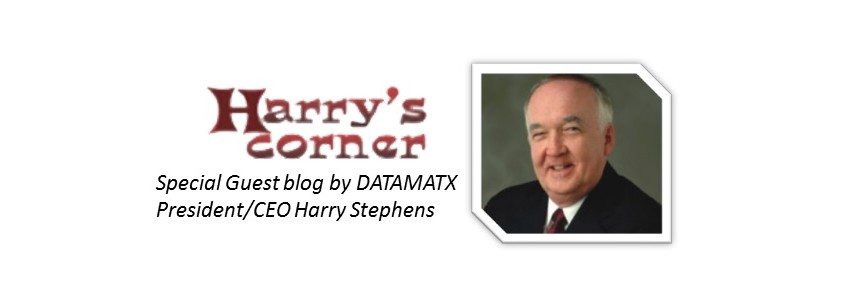Harry’s Corner – 47-47-6 Unintended Consequences
Submitted by Harry Stephens, President/CEO of DATAMATX
November 21, 2016
We held our annual INg meeting at Orlando in conjunction with this year’s Graph Expo in September. One of the speakers at our meeting was a labor attorney and among the many things he spoke to us about was the upcoming Overtime Rule. For those of you that may not know specific details on this new rule, starting on December 1 2016, the salary threshold to avoid paying overtime will move to $913 per week (an annual salary of $47,476) from the current $455 per week. Right now, hourly workers, lower-wage earners and non-managerial workers must be paid 1.5 times their hourly wage when they work more than 40 hours in a week. Under the new rule, an estimated 4.2 million workers, including those on salary, will be eligible for overtime.
On November 10th, at the Fall Board of Director’s meeting for the Georgia Chamber of Commerce, where I am on the board, the issue came up again. The Georgia Chamber of Commerce represents the unified voice of Georgia’s business community with the motto “What’s good for business is good for Georgia” driving its policy and legislative direction to ensure the future of economic mobility for all Georgians. So it makes sense that business and job creation are always a focus. I brought up this impending Overtime Rule at the meeting, encouraging both the local and national Chamber of Commerce to vocally oppose this type of job creation loss initiative as it will certainly have unintended consequences, hurting the people it intended to help.
For example, in lower-paid jobs where the minimum wage is also increasing, employers are put in the difficult situation of having middle managers making considerably less per working hour than new hires. Think of the restaurant industry where wages may be lower, hours are long and profit margins very thin. While this rule is meant to increase take-home pay, these changes may limit employment and advancement opportunities in this industry and others like it. Another good example—college graduates looking for their first job. An employer will certainly have to think twice about hiring an inexperienced worker who needs time to “learn on the job” for an annual salary of $47,476.00 or unbudgeted overtime. Jobs are hard enough to get when you don’t have the right experience. This rule will make it even more difficult. Unintended consequences. Hurting the people it intended to help.
For every business, this rule causes a number of consequences as well, particularly when it comes to payroll. We essentially have two choices. If the increased salary threshold creates newly non-exempt employees to stay compliant, we need to either pay employees higher salaries, or pay overtime wages.
In preparation, classifying employees correctly as to whether they are exempt or non-exempt will be extremely important, particularly if you are in a business that has peaks in productivity at times that require employees to work longer hours, like month end or holidays. Because of this, I recommend checking out the Department of Labor or your state’s wage enforcement agency to get the exact requirements. The last thing a business needs is unexpected financial or legal consequences for not clearly stating an employee’s classification, entitlement to overtime and tracking of such.
It will also be important to have clear communication with employees about record keeping. For some who have been proud of being a “white collar worker” now required to keep track of time, this can be difficult. Explaining the rule and how it will affect them and your business will ease any misconceptions they may have about any changes in job description or pay.
Oh, and another piece of “good news.” The minimum salary threshold will automatically increase every three years based on wage growth. The first automatic increase will happen on Jan. 1, 2020, which means more employees will become exempt as the threshold rises. Now, if you think you are in the clear because you are a small business, I have more “good news.” The Department of Labor FAQ fact sheet does say that “the proposed rule [applies] to employees of enterprises that have an annual gross volume of sales made or business done of $500,000 or more, and certain other businesses.” Ok. If your business makes less than $500,000 of annual revenue, is it exempt? It appears the answer is still no. Under the Fair Labor Standards Act (FLSA), individual employees may still be “covered in any workweek when they are individually engaged in interstate commerce, the production of goods for interstate commerce, or an activity that is closely related and directly essential to the production of such goods.” Like I said earlier – research the information on the Department of Labor’s website or your state’s wage enforcement agency to get the exact requirements of the ruling.
There is no way around the fact that this ruling is bad for business—especially small to medium businesses that have a hard enough time growing their businesses as it is. We need dedicated employees who consider themselves professionals and want to work the long hours often needed to get ahead and grow in their profession. Employers will now have a hard time giving them that choice. Instead of benefiting workers, the rule takes away flexible schedules and maybe even certain career pursuits. For businesses, it places yet another financial burden to manage. Perfect examples of unintended consequences hurting the people it intended to help.
Until next time – Harry
Harry Stephens is President/CEO, and founder of DATAMATX, one of the nation’s largest privately held, full-service providers of printed and electronic billing solutions. He has been active in the Atlanta business community for over 40 years in various professional and trade organizations, most recently as a board member of the Georgia Chamber of Commerce. As an advocate for business mailers across the country, Stephens is actively involved in several postal trade associations. He serves on the Executive Board of the Greater Atlanta Postal Customer Council, Board Member of the National Postal Policy Council (NPPC), Member of Major Mailers Association(MMA), and member of the Coalition for a 21st Century Postal Service. He is also immediate past president of the Imaging Network Group (INg), an association for Print/Mail Service Bureaus. As an expert on high-volume print and mail, he has frequently been asked to speak to various USPS groups, including the Board of Governors, about postal reform and other issues affecting business mailers. Find DATAMATX at www.datamatx.com






